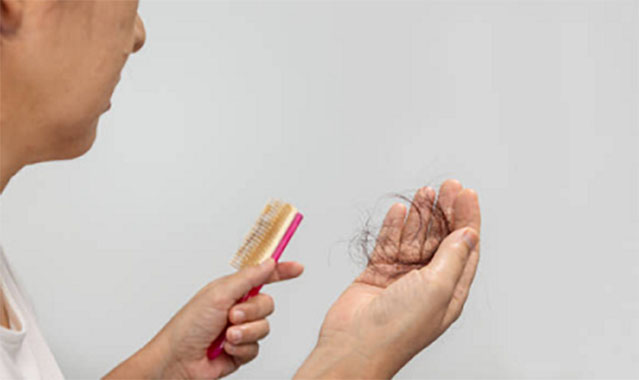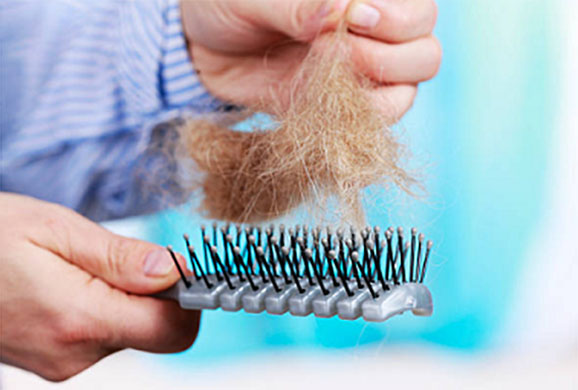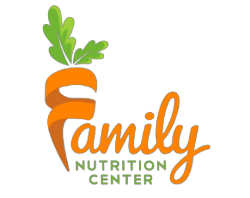The topic of hair loss in women is a sensitive and private subject, usually a subject not discussed very often. I see how it has affected me, as well as my friends and colleagues. I am looking at the science of treatment for hair loss. There are medications but not something I would like to entertain. Being a registered dietitian/nutritionist (RDN), the first intervention I think of is nutrition.

What We Know
Diet plays a vital role in hormonal balance. Research has found that women who experience hair loss during menopause may not be getting all the nutrients they need. Eating a well-balanced diet that is high in nutrients can aid in the reduction of hair loss.
Some specific nutrients and foods you should be incorporating are:
Protein: Lean meats, soy products, dairy products, nuts, beans
Fats: Fatty fish, flaxseed, nuts, soybeans, plant oils
Vitamins: Vitamins A, B, C, and D. Citrus fruits, red peppers, leafy greens, tomatoes, carrots, salmon, egg yolks, dairy products
Minerals: Zinc, iron, copper, selenium, calcium, and magnesium. Yogurt, cheese, berries, starchy vegetables, ancient grains, leafy greens
Gut Microbiome
The importance of microbiomes has been an important area of research. The microbiome consists of microbes that are both helpful and potentially harmful. Most are symbiotic (where both the human body and microbiota benefit), and some, in smaller numbers, are pathogenic (promoting disease). In a healthy body, pathogenic and symbiotic microbiota coexist without problems. But if there is a disturbance in that balance, dysbiosis occurs, stopping these normal interactions. As a result, the body may become more susceptible to disease.
Alterations to the microbiome have the potential to compromise gut function. Threats to a healthy gut microbiome include stress, frequent antibiotic use, poor diet, and other behaviors development of health problems, including potential hair loss.
Research demonstrates that what we eat and DON’T eat directly impacts gut health and levels of inflammation.
Poor nutrition creates chronic inflammation and metabolic dysregulation, usually accompanied by obesity, leading to other chronic diseases.
The gut microbiome impacts:
Digestion of food
How we store fat
Immune system
Glucose levels
Brain Health
Most other bodily processes
Causes of hair loss
Hormonal fluctuations are the chief cause of hair loss, as seen in menopause. During perimenopause, estrogen and progesterone levels begin to decline. These hormones play a role in promoting hair growth. When they drop, it leads to thinning hair that doesn’t grow as quickly as before. Studies show slightly more than half of all women may experience some hair thinning or loss related to menopause or changes in the texture and strength of their hair.
How to Treat Menopausal Hair Loss
Treatments for menopausal hair loss may include lifestyle modifications, diet, vitamins, medications, and professional treatments.

Vitamin supplementation:
As I reviewed this subject and the limited and or often expensive treatment options, I decided to look at vitamin supplements.
Promoting vitamin supplements where appropriate as part of treatment for chronic disease is not uncommon for RDNs. Mostly, I always say to eat real food first, but knowing that is not always the answer has not helped many with hair loss.
While researching, I was impressed by the work at Nutrafol, which is driven by research and grounded in science. The amount of research conducted by Nutrafol and dermatologists is extensive. https://nutrafol.com/clinical/
The nutrients deficiencies that lead to hair thinning are included in Nutrafol vitamins, including:
Zinc
Vitamin D
Biotin
Iron
Vitamin B12
I started taking Nutrafol, and since seeing good results, I am recommending Nutrafol to others through our center, which is something I have never done before, but I am passionate about women getting help for hair loss.
Look at the research and decide for yourself.
If you purchase Nutrafol https://nutritionandfamily.com/products/ through Family Nutrition Center, a portion will be donated to the Family Nutrition Center Foundation.




